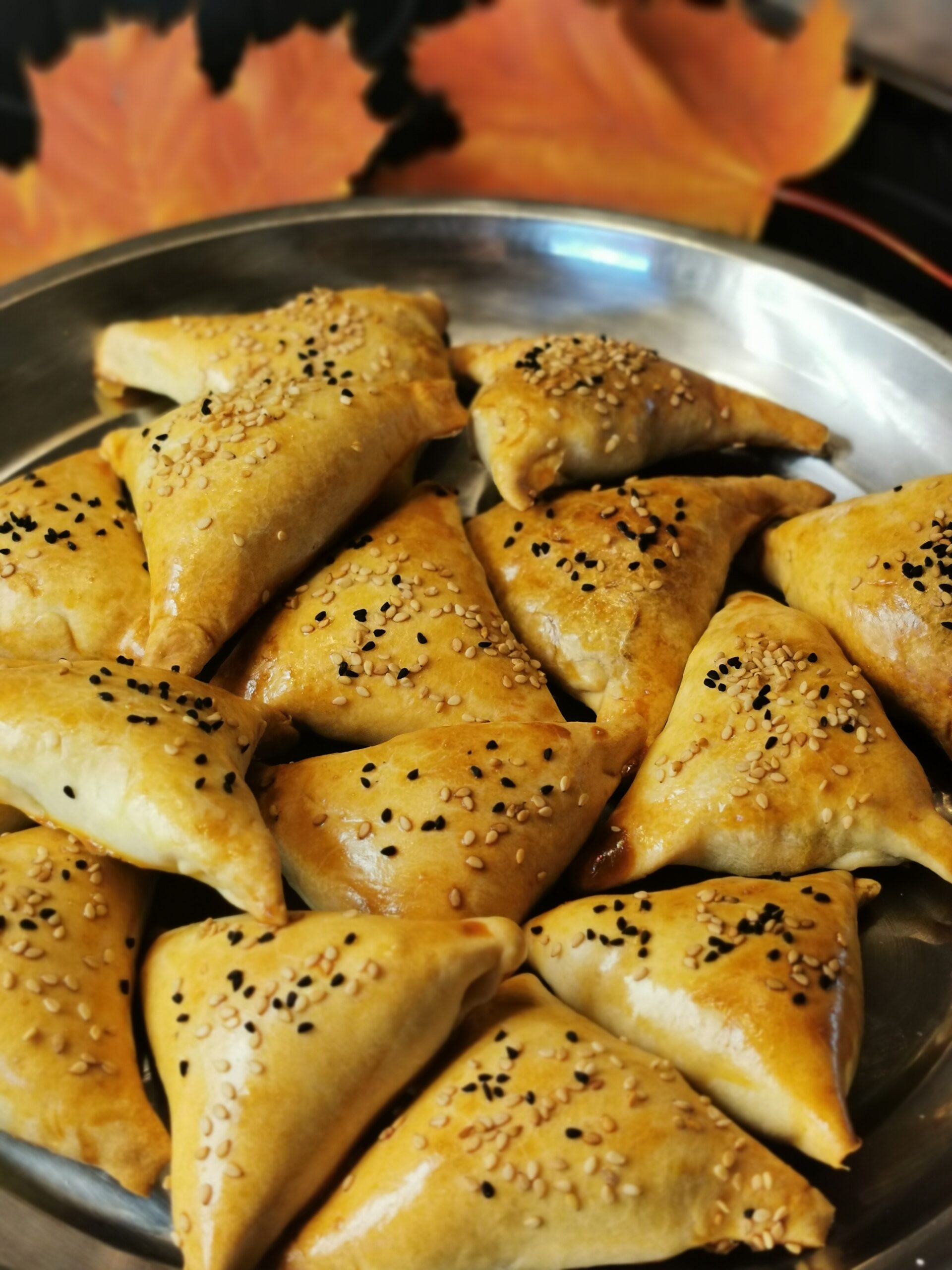Like all Jews, Bukharian Jews celebrate Passover with a seder ceremony and meal. However, we have many Passover traditions and customs that are unique to our community. For example, at the seder we wear the jomah, a colorful Bukharian kaftan (robe) with gold embroidery. Both men and women dress up in this clothing because to us it represents being royal and free.
There are different theories about the origins of the jomah. One is that it dates to a time during the Ottoman empire when Jews in Central Asia were discriminated against. They were forced to wear different clothing from their non-Jewish neighbors to set them apart. In some towns they had to wear a yellow hat or a Star of David. These restrictions sparked a movement among Bukahrian Jews: They decided to separate themselves by wearing the most colorful and luxurious clothing they could afford. Muslim men wore black and white head coverings at that time, so Bukharian men started wearing the colorful kippot familiar to many American Jews and popular among children and hipsters.
At a traditional Bukharian seder, family members and guests sit around the table by seniority. The elders sit closest to the host, and women and men traditionally sit on opposite sides. (Today some families alternate man-woman-woman-man.) The young people in the family are responsible for bringing water around the table for everyone to wash their hands before the meal. After each cup of wine, we rinse our cups with water so we don’t mix wine from one cup with wine from the next. There is usually one designated person to perform that task, and it is a great honor to do it.
On the seder plate, instead of a lamb shank, we have a lamb foot. Instead of horseradish, we have romaine lettuce. We have a special charoset, known as chaliko (see recipe below). We also have our own Haggadah that has Bukharian (Judeo-Tajik or Judeo-Persian) songs written in Hebrew letters. We do not sing Echad Mi Yodea, the traditional end-of-seder Hebrew song. Rather, we sing Yakumin Ki Medonad in Bukharian. We also have our own version of Chad Gadya—Jon Buzghole—that is about the circle of life.
Our seders are very interactive. We have skits where we pretend to be Jewish slaves who have just escaped from Egypt. Before the afikomen is discovered, an elder walks around the table asking who has the afikomen and “whipping” everyone with a towel so they feel a little bit of the pain that the Israelites did when they were slaves.
As for the food, some of us make our own matzah like we did in the old country. Our matzah resembles laffa flatbread, although today many Bulkharian Jews in the United States eat store-bought matzah. We eat kitniyot, so we always have a variety of rice dishes.
Below you will find two Bukharian Passover recipes. The first is for a meat soup that we use as a dipping sauce for our matzah. The other is for Bukharian charoest, which sometimes includes dried apricot. Chag sameach to you and your family!
Traditional Bukharian Soup (Oshi Masozgoshak)
This recipe comes from Classic Central Asian (Bukharian) Jewish Cuisine and Customs by Amnun Kimyagarov. Serves 8 to 10/makes about 15 cups.
Ingredients
For the soup:
3 tablespoons vegetable, safflower, or canola oil
2 cups coarsely chopped onions (about 1 large)
1¼ pounds veal stew, beef stew, or chicken thighs cut into ¼-inch pieces
12 cups homemade plain veal, beef, or chicken broth or water
Meat bone (can be 2 reserved bones from chicken thighs, or 1 from veal or beef)
2 teaspoons fine sea salt
3 to 4 generous grindings of fresh black pepper
¾ pound carrots, cut into ½-inch cubes (about 2 cups cubed)
¾ pound white potatoes, cut into ½-inch cubes (about 2 cups cubed)
1½ cups dried golden or yellow plums, or Persian dried sour plums*
2 cups finely chopped sorrel leaves or loosely packed coriander leaves (stems discarded)
6 large eggs, lightly beaten
*If you cannot find these from an Asian, Persian, Central Asian/Russian, or Middle Eastern specialty grocery store then substitute with dried California apricots and several tablespoons of freshly squeezed lemon juice until you have reached desired tartness.
For serving:
4 squares matzah, broken into 2-inch pieces
Instructions
- Pour oil into a large 4- to 6-quart pot or saucepan and warm over high heat for 1 minute. Reduce to a medium-high heat and mix in onions. Cook for 5 to 7 minutes until very soft but not browned.
- Add meat and mix well. Cook meat, stirring often, until it becomes a greyish-brown color, about 5 minutes.
- Pour in broth (or water), and add bone(s), salt, and pepper and bring to boil over high heat. Reduce to a medium heat and simmer for 15 minutes, uncovered.
- Add the whole dried plums or apricots, mix well, and continue to simmer an additional 15 minutes uncovered.
- Add the carrot and potato pieces, and chopped sorrel (or coriander leaves) and mix well. Cook 10 minutes over medium heat, just until potatoes become soft but not mushy.
- Slowly add the beaten eggs while stirring until eggs become long strands like egg drop soup, about 1 minute. Remove from heat and serve immediately into individual soup bowls with about ½ a square matzah broken up into each bowl.
***
Bukharian Charoset with Nuts (Chaliko)
This recipe is courtesy of Michelle Natanova, a member of Queens College Hillel, and her grandmother Margarita.
Ingredients
1 pound black raisins
¾ pound walnuts
1 big red apple
Rashi wine or grape juice

(Courtesy of Manashe Khaimov)
Instructions
Wash the raisins and inspect the walnuts before use, to ensure that they do not have any insects. Grind the raisins, walnuts, and apple together. Add enough wine to smoothen out the mixture and make it soft. Some people add in dried apricot.

(Courtesy of Manashe Khaimov)







